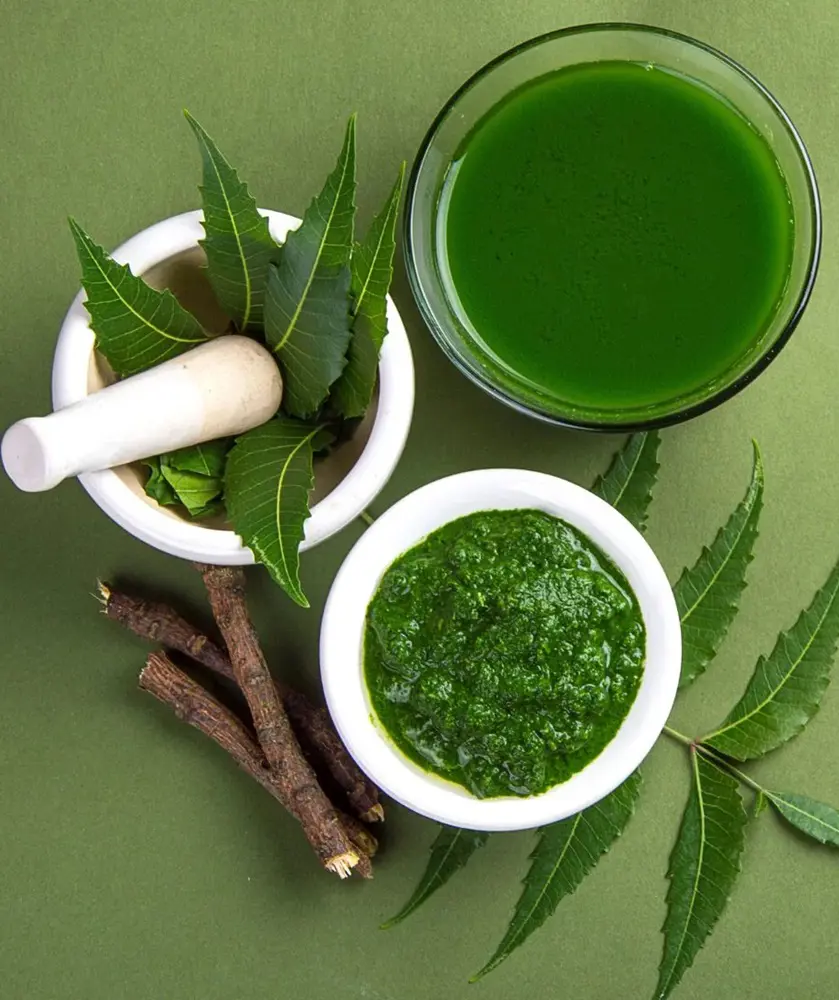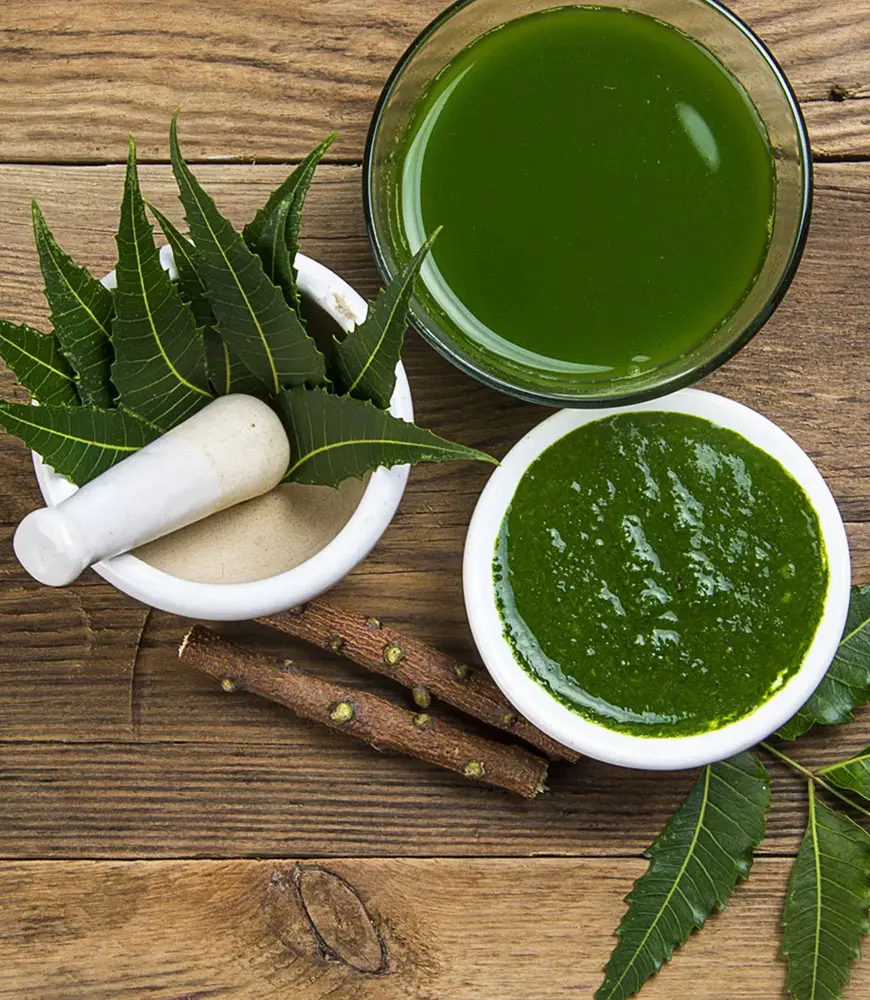16 Neem Benefits and Medicinal Uses

Neem, often referred to as the "wonder leaf," has been an integral part of traditional medicine in many cultures for centuries. Scientifically known as Azadirachta indica, neem is renowned for its multifaceted properties that extend far beyond mere medicinal uses.
In this comprehensive article, we delve into the myriad benefits and versatile applications of neem, shedding light on its therapeutic potential, ecological significance, and more.
1. Powerful Antimicrobial Agent
Neem is renowned for its potent antimicrobial properties, effectively combating a wide range of pathogens including bacteria, viruses, and fungi. Its ability to inhibit the growth and spread of these microbes has been utilized extensively in traditional medicines and herbal remedies for treating various infections.
By incorporating neem into treatments, it is possible to address skin infections, respiratory issues, and digestive ailments, leveraging its natural ability to combat harmful microorganisms without the adverse side effects often associated with synthetic antibiotics.
2. Skin Savior
Neem is a boon for skin health, owing to its antibacterial, antifungal, and anti-inflammatory properties. It is particularly effective in combating skin conditions such as acne, eczema, and psoriasis, promoting clearer and healthier skin.
Neem-based skincare products provide natural solutions for maintaining skin vitality and radiance. These products help reduce redness, swelling, and irritation, offering a holistic approach to skincare that supports the skin's natural healing processes while protecting against further damage.
3. Dandruff Destroyer
Neem oil is celebrated for its effectiveness in combating dandruff and nourishing the scalp. Regular use of neem-based hair care products can alleviate dryness, itchiness, and flakiness, leaving the scalp refreshed and the hair lustrous.
The antifungal properties of neem help eliminate the fungi responsible for dandruff, while its moisturizing effects keep the scalp healthy. This dual action ensures that neem not only addresses the symptoms of dandruff but also tackles its root causes, promoting overall scalp health.
4. Oral Care Champion
Neem's natural antibacterial properties make it an excellent ally for oral hygiene. Chewing neem twigs or using neem-based toothpaste and mouthwash helps fight plaque, prevent cavities, and freshens breath, promoting overall oral health.
Neem's antimicrobial action reduces the bacterial load in the mouth, which is essential for preventing tooth decay and gum disease. Its regular use can significantly improve oral hygiene, offering a natural alternative to chemical-based dental products.
5. Digestive Aid

Neem supports digestive health by stimulating appetite, aiding digestion, and relieving gastrointestinal discomfort. Neem leaf extracts and supplements are traditionally used to alleviate indigestion, bloating, and constipation, promoting digestive well-being.
Its anti-inflammatory and antimicrobial properties help balance gut flora and soothe the digestive tract, ensuring smooth digestion and absorption of nutrients. Neem’s ability to cleanse the digestive system makes it an invaluable natural remedy for maintaining digestive health.
6. Immune Booster
Neem enhances immune function by modulating the body's immune response. Regular consumption of neem supplements or tea may help strengthen the immune system, making the body more resilient to infections and diseases.
Neem’s immunomodulatory properties ensure that the immune system is neither overactive nor underactive, providing a balanced defense against pathogens. This makes neem a powerful natural ally in maintaining overall health and preventing illness, especially during times of stress or seasonal changes.
7. Liver Protector
Neem supports liver health by promoting detoxification and protecting against liver damage. Its hepatoprotective properties help maintain liver function and prevent the accumulation of toxins, supporting overall well-being.
Neem enhances the liver’s ability to filter and eliminate toxins from the bloodstream, reducing the burden on this vital organ. Regular use of neem can help protect the liver from damage caused by environmental toxins, alcohol, and certain medications, ensuring long-term liver health.
8. Anti-inflammatory Wonder
Neem contains compounds with potent anti-inflammatory effects, offering relief from pain and inflammation associated with arthritis, rheumatism, and inflammatory skin conditions. Neem-based remedies provide natural relief without the side effects of conventional medications.
By reducing inflammation at the source, neem helps alleviate symptoms such as swelling, redness, and pain. This makes neem an effective natural treatment for chronic inflammatory conditions, improving the quality of life for those affected.
9. Diabetes Management Aid
Research suggests that neem may help regulate blood sugar levels and improve insulin sensitivity, making it beneficial for individuals with diabetes. Neem supplements or tea may complement diabetes management by supporting glucose metabolism.
Its compounds help lower blood glucose levels and improve the body’s response to insulin. By integrating neem into their routine, individuals with diabetes can better manage their condition and reduce the risk of complications associated with high blood sugar levels.
10. Heart Health Guardian

Neem's antioxidant properties contribute to cardiovascular health by reducing oxidative stress and cholesterol levels. Regular consumption of neem may help lower the risk of heart disease and promote overall cardiovascular well-being.
By preventing the oxidation of cholesterol, neem helps maintain healthy arteries and improves blood flow. Its anti-inflammatory properties also reduce the risk of atherosclerosis and other heart-related conditions, making neem a valuable addition to heart health management.
11. Anticancer Potential
Preliminary studies indicate that neem extracts may exhibit anticancer properties by inhibiting the growth and proliferation of cancer cells. Compounds found in neem have shown promising results in preclinical studies, highlighting its potential as a natural cancer therapy.
Neem’s ability to induce apoptosis (programmed cell death) in cancer cells while sparing healthy cells makes it a particularly attractive option for further research. These findings suggest that neem could be an effective complementary treatment in cancer therapy.
12. Wound Healer
Neem accelerates wound healing and prevents infections with its antiseptic and antibacterial properties. Neem oil or neem-based creams can be applied topically to cuts, scrapes, and burns to promote faster healing and reduce scarring.
By creating a protective barrier against pathogens, neem ensures that wounds remain clean and infection-free. Its anti-inflammatory properties also help reduce swelling and pain, facilitating the healing process and improving recovery outcomes.
13. Neuroprotective Shield
Neem's neuroprotective properties help safeguard the brain against oxidative damage and neurodegenerative diseases. Regular consumption of neem may support brain health and cognitive function, reducing the risk of conditions like Alzheimer's and Parkinson's disease.
By protecting neurons from oxidative stress, neem helps maintain brain health and prevent cognitive decline. This makes neem a valuable natural remedy for supporting long-term brain function and mental clarity.
14. Respiratory Relief
Neem is beneficial for respiratory health, thanks to its antimicrobial and anti-inflammatory properties. Neem supplements or tea may help alleviate symptoms of respiratory infections, asthma, and allergies, promoting clearer breathing and lung function.
By reducing inflammation in the airways and eliminating pathogens, neem helps improve respiratory health and ease breathing difficulties. This makes neem a valuable natural treatment for maintaining respiratory wellness.
15. Gastrointestinal Guardian
Neem supports gastrointestinal health by soothing inflammation, combating infections, and promoting the growth of beneficial gut bacteria. Neem supplements or extracts may help alleviate symptoms of gastrointestinal disorders like gastritis, ulcers, and irritable bowel syndrome.
By maintaining a balanced gut microbiome and reducing harmful bacteria, neem promotes a healthy digestive environment. Its anti-inflammatory properties also help soothe the digestive tract, providing relief from chronic gastrointestinal issues.
16. Environmental Champion
Beyond its medicinal benefits, neem plays a vital role in environmental sustainability and conservation. Neem trees help purify the air, enrich the soil, and provide habitat and sustenance for diverse wildlife, contributing to ecological balance and resilience.
The widespread planting of neem trees can improve soil fertility, reduce erosion, and support biodiversity. This makes neem an important species for environmental restoration and conservation efforts, enhancing the health of natural ecosystems.
Neem’s Risks And Potential Side Effects

While neem is widely celebrated for its medicinal benefits and ecological significance, it's essential to recognize that it also carries certain risks and potential side effects. Understanding these can help ensure its safe and effective use.
Potential Side Effects and Risks
-
Toxicity in High Doses: Neem can be toxic if consumed in large quantities. Neem oil, in particular, is highly concentrated and should be used with caution. Overconsumption can lead to symptoms such as nausea, vomiting, diarrhea, and metabolic acidosis. In severe cases, it can cause seizures, loss of consciousness, or even death.
-
Pregnancy and Fertility Concerns: Pregnant women should avoid neem due to its potential to cause miscarriage. Neem has been shown to possess abortifacient properties, meaning it can induce abortion when taken in significant amounts. Additionally, studies suggest that neem may affect fertility, and therefore it should be used with caution by those trying to conceive.
-
Children’s Safety: Neem oil and high doses of neem products are particularly hazardous for children. There have been reports of neem oil poisoning in children, leading to severe symptoms such as vomiting, drowsiness, seizures, and coma. Therefore, neem oil should be kept out of reach of children and used only under medical supervision if necessary.
-
Allergic Reactions: Some individuals may be allergic to neem. Symptoms of an allergic reaction can include itching, rash, hives, and in severe cases, difficulty breathing. Conducting a patch test before using neem oil or neem-based skin products can help determine if one is allergic.
-
Blood Sugar Levels: Neem has hypoglycemic properties, meaning it can lower blood sugar levels. While this can be beneficial for individuals with diabetes, it can also pose risks. For those taking diabetes medications, using neem can cause blood sugar levels to drop too low, leading to hypoglycemia. Monitoring blood sugar levels closely and consulting with a healthcare provider before combining neem with diabetes treatments is advisable.
-
Liver and Kidney Health: Long-term use or high doses of neem may impact liver and kidney function. There have been cases of neem-induced liver toxicity, characterized by elevated liver enzymes and liver damage. Individuals with pre-existing liver or kidney conditions should use neem cautiously and under medical supervision.
-
Interactions with Medications: Neem may interact with certain medications, including those for diabetes, hypertension, and blood clotting disorders. These interactions can alter the efficacy of the medications or exacerbate side effects. Consulting a healthcare provider before incorporating neem into a treatment regimen is essential.
-
Digestive Issues: Ingesting neem in large amounts can cause digestive discomfort, such as stomach cramps, nausea, and diarrhea. It’s crucial to adhere to recommended dosages to avoid gastrointestinal distress.
FAQs About the Medicinal Uses of Neem
1. What are the primary medicinal uses of neem?
Neem is renowned for its wide range of medicinal applications, including:
- Antimicrobial: Neem possesses strong antibacterial, antiviral, and antifungal properties, making it effective in treating infections and skin conditions like acne, eczema, and psoriasis.
- Anti-inflammatory: Neem's anti-inflammatory compounds help alleviate symptoms of arthritis, rheumatism, and other inflammatory conditions.
- Immune Support: Neem boosts the immune system, helping the body fight off infections and diseases.
- Oral Health: Neem is used in dental care products for its ability to prevent plaque, gum disease, and cavities.
- Digestive Health: Neem aids digestion, relieves constipation, and supports liver health by detoxifying the body.
2. How is neem used in skin care and hair care?
Neem is a popular ingredient in skincare and hair care products due to its natural healing properties:
- Skincare: Neem oil, neem leaf extract, and neem-based creams are used to treat acne, reduce blemishes, and soothe irritated skin. Its antibacterial properties help clear up infections, while its anti-inflammatory effects reduce redness and swelling.
- Hair Care: Neem oil is used to combat dandruff, nourish the scalp, and promote healthy hair growth. It helps alleviate scalp itchiness and dryness, and its antifungal properties can treat scalp infections.
3. Can neem help manage diabetes?
Yes, neem has shown potential in managing diabetes:
- Blood Sugar Regulation: Neem leaf extracts can help lower blood sugar levels by improving insulin sensitivity and promoting glucose metabolism. This makes neem a beneficial supplement for individuals with diabetes.
- Complementary Therapy: While neem can aid in managing blood sugar levels, it should not replace conventional diabetes treatments. It is important to consult a healthcare provider before incorporating neem into a diabetes management plan.
4. Are there any side effects or risks associated with using neem?
While neem offers numerous benefits, it also has potential side effects and risks:
- Toxicity: High doses of neem, especially neem oil, can be toxic, leading to symptoms such as nausea, vomiting, and seizures. It should be used cautiously, particularly in children and pregnant women.
- Allergic Reactions: Some individuals may be allergic to neem, resulting in skin rashes or respiratory issues.
- Drug Interactions: Neem can interact with certain medications, including those for diabetes and hypertension, potentially altering their effects.
- Liver and Kidney Health: Long-term use or high doses of neem may affect liver and kidney function, so individuals with pre-existing conditions should use it under medical supervision.
5. How can neem be incorporated into daily health routines?
Neem can be incorporated into daily routines in various forms:
- Oral Supplements: Neem capsules or tablets can be taken daily to support overall health, boost immunity, and regulate blood sugar levels.
- Neem Tea: Drinking neem tea made from neem leaves can help with digestion, detoxification, and immune support.
- Topical Applications: Neem oil or neem-based creams can be applied to the skin to treat acne, eczema, and other skin conditions. Neem oil can also be massaged into the scalp for hair health.
- Dental Care: Using neem toothpaste or mouthwash can improve oral hygiene and prevent dental issues.
Neem's versatility and potent therapeutic properties make it a valuable addition to natural health practices, but it is crucial to use it responsibly and under appropriate guidance.







